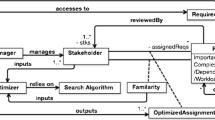Abstract
One of the most important and recurring issues that the development of a software product faces is the requirements selection problem. Addressing this issue is especially crucial if agile methodologies are used. The requirements selection problem, also called Next Release Problem (NRP), seeks to choose a subset of requirements which will be implemented in the next increment of the product. They must maximize clients satisfaction and minimize the cost or effort of implementation. This is a combinatorial optimization problem studied in the area of Search-Based Software Engineering. In this work, the performance of a basic genetic algorithm and a widely used multi-objective genetic algorithm (NSGA-II) have been compared against a multi-objective version of a randomized greedy algorithm (GRASP). The results obtained show that, while NSGA-II is frequently used to solve this problem, faster algorithms, such as GRASP, can return solutions of similar or even better quality using the proper configurations and search techniques. The repository with the code and analysis used in this study is made available to those interested via GitHub.
This work has been partially funded by the Regional Government (JCCM) and ERDF funds through the projects SBPLY/17/180501/000493 and SBPLY/21/180501/000148.
Access this chapter
Tax calculation will be finalised at checkout
Purchases are for personal use only
Similar content being viewed by others
Notes
- 1.
Although “stakeholder” is a more appropriate term, “client” will be used to keep coherence with previous works present in the literature.
References
Bagnall, A.J., Rayward-Smith, V.J., Whittley, I.M.: The next release problem. Inf. Softw. Technol. 43(14), 883–890 (2001)
Baker, P., Harman, M., Steinhöfel, K., Skaliotis, A.: Search based approaches to component selection and prioritization for the next release problem. In: 2006 22nd IEEE International Conference on Software Maintenance, pp. 176–185 (2006)
Chaves-González, J.M., Pérez-Toledano, M.A., Navasa, A.: Software requirement optimization using a multiobjective swarm intelligence evolutionary algorithm. Knowl.-Based Syst. 83(1), 105–115 (2015)
Deb, K., Pratap, A., Agarwal, S., Meyarivan, T.: A fast and elitist multiobjective genetic algorithm: NSGA-II. IEEE Trans. Evol. Comput. 6(2), 182–197 (2002)
del Sagrado, J., del Águila, I.M., Orellana, F.J.: Ant colony optimization for the next release problem: a comparative study. In: 2010 Proceedings - 2nd International Symposium on Search Based Software Engineering SSBSE, pp. 67–76 (2010)
Durillo, J.J., Zhang, Y., Alba, E., Nebro, A.J.: A study of the multi-objective next release problem. In: 2009 Proceedings - 1st International Symposium on Search Based Software Engineering SSBSE (2009)
Feo, T., Resende, M.: Greedy randomized adaptive search procedures. J. Global Optim. 6, 109–133 (1995). https://doi.org/10.1007/BF01096763
Finkelstein, A., Harman, M., Mansouri, S.A., Ren, J., Zhang, Y.: A search based approach to fairness analysis in requirement assignments to aid negotiation, mediation and decision making. Requirements Eng. 14(4), 231–245 (2009)
Greer, D., Ruhe, G.: Software release planning: an evolutionary and iterative approach. Inf. Softw. Technol. 46, 243–253 (2004)
Laguna, M., Marti, R.: GRASP and path relinking for 2-layer straight line crossing minimization. INFORMS J. Comput. 11(1), 44–52 (1999)
del Sagrado, J., del Águila, I., Orellana, F.J.: Multi-objective ant colony optimization for requirements selection. Empir. Softw. Eng. 20, 577–610 (2015). https://doi.org/10.1007/s10664-013-9287-3
Schott, J.: Fault tolerant design using single and multicriteria genetic algorithm optimization. Ph.D. thesis, Massachusetts Institute of Technology, M.S., USA (1995)
Zhang, Y., Harman, M., Mansouri, A.: The multi-objective next release problem. In: GECCO 2007: Genetic and Evolutionary Computation Conference, pp. 1129–1137 (2007)
Zitzler, E., Thiele, L.: Multiobjective evolutionary algorithms: a comparative case study and the strength Pareto approach. IEEE Trans. Evol. Comput. 3(4), 257–271 (1999)
Author information
Authors and Affiliations
Corresponding author
Editor information
Editors and Affiliations
Rights and permissions
Copyright information
© 2022 The Author(s), under exclusive license to Springer Nature Switzerland AG
About this paper
Cite this paper
Pérez-Piqueras, V., López, P.B., Gámez, J.A. (2022). GRASP-Based Hybrid Search to Solve the Multi-objective Requirements Selection Problem. In: Dorronsoro, B., Pavone, M., Nakib, A., Talbi, EG. (eds) Optimization and Learning. OLA 2022. Communications in Computer and Information Science, vol 1684. Springer, Cham. https://doi.org/10.1007/978-3-031-22039-5_15
Download citation
DOI: https://doi.org/10.1007/978-3-031-22039-5_15
Published:
Publisher Name: Springer, Cham
Print ISBN: 978-3-031-22038-8
Online ISBN: 978-3-031-22039-5
eBook Packages: Computer ScienceComputer Science (R0)




